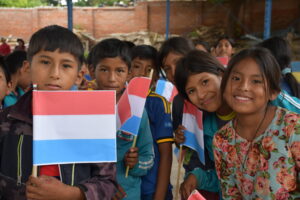Boys, girls, teenagers and their families are agents of change in adapting to climate change
Number of beneficiaries: 709 children and 750 people
Project duration: 2024/2028 – 5 years
Place: Municipality of Poroma, Province of Oropeza
Project financed under a framework agreement by the Ministry of Foreign Affairs of the Grand Duchy of Luxembourg

Local partner
SUMAJ PUNCHAY is a non-profit, non-governmental organization that operates mainly in marginalized and remote regions of Bolivia. Affected by the high level of poverty in rural Bolivia, SUMAJ PUNCHAY was formed in 2001. “SUMAJ PUNCHAY” is a term of Quechua origin which means “towards better days”. Its objective is to provide future generations the conditions for greater social justice, education, health, respect for the environment and the biodiversity, self-determination, gender equality, all of this within the framework of respect for human rights, and in particular the rights of indigenous peoples.
Context
The municipality of Poroma has the 2nd highest poverty rate in the department of Chuquisaca, which is not getting better with climate change. However, this area has advantages: its low migration rate and its high number of children/teenagers. Implementing a production model that will be resilient to the climate crisis by directly involving the population will allow sustainable management of their natural resources. Acquiring this knowledge will help them improve their productive output and their living conditions.
The mission
This project will make it possible to design a model that will be resilient to the climate crisis for the population of Poroma.
Activities
-Carry out reforestation and river cleaning campaigns with children/teenagers.
-Train students in organic farming, climate, and food justice.
-Build or rehabilitate irrigation systems.
-Train producers in reforestation, types of irrigation and ecological production.
-Implement certified ecological crops.
-Create an associative marketing model.
Beneficiaries
750 people from 6 communities in Poroma (150 families) and 709 children/teenagers from 6 schools

